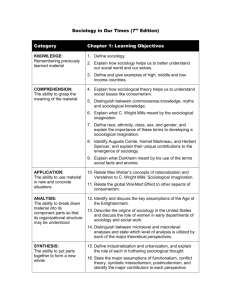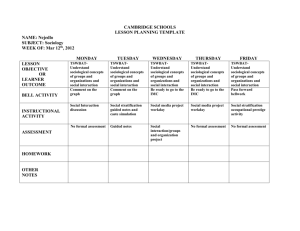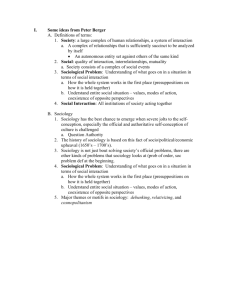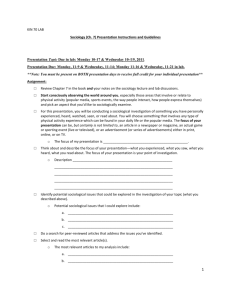Sociology 101 The Sociological Imagination
advertisement
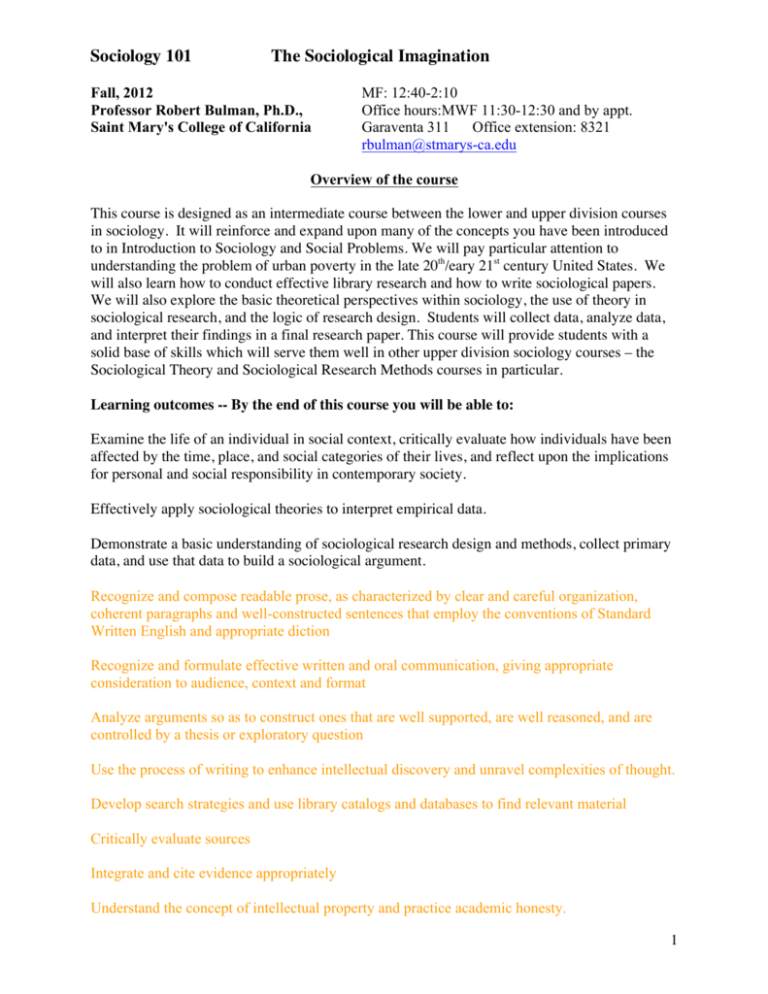
Sociology 101 The Sociological Imagination Fall, 2012 Professor Robert Bulman, Ph.D., Saint Mary's College of California MF: 12:40-2:10 Office hours:MWF 11:30-12:30 and by appt. Garaventa 311 Office extension: 8321 rbulman@stmarys-ca.edu Overview of the course This course is designed as an intermediate course between the lower and upper division courses in sociology. It will reinforce and expand upon many of the concepts you have been introduced to in Introduction to Sociology and Social Problems. We will pay particular attention to understanding the problem of urban poverty in the late 20th/eary 21st century United States. We will also learn how to conduct effective library research and how to write sociological papers. We will also explore the basic theoretical perspectives within sociology, the use of theory in sociological research, and the logic of research design. Students will collect data, analyze data, and interpret their findings in a final research paper. This course will provide students with a solid base of skills which will serve them well in other upper division sociology courses – the Sociological Theory and Sociological Research Methods courses in particular. Learning outcomes -- By the end of this course you will be able to: Examine the life of an individual in social context, critically evaluate how individuals have been affected by the time, place, and social categories of their lives, and reflect upon the implications for personal and social responsibility in contemporary society. Effectively apply sociological theories to interpret empirical data. Demonstrate a basic understanding of sociological research design and methods, collect primary data, and use that data to build a sociological argument. Recognize and compose readable prose, as characterized by clear and careful organization, coherent paragraphs and well-constructed sentences that employ the conventions of Standard Written English and appropriate diction Recognize and formulate effective written and oral communication, giving appropriate consideration to audience, context and format Analyze arguments so as to construct ones that are well supported, are well reasoned, and are controlled by a thesis or exploratory question Use the process of writing to enhance intellectual discovery and unravel complexities of thought. Develop search strategies and use library catalogs and databases to find relevant material Critically evaluate sources Integrate and cite evidence appropriately Understand the concept of intellectual property and practice academic honesty. 1 Course pre-requisites: Sociology 2 or 4. English 5 Final grades will be determined by the following assignments: Quality of Participation: In addition to regular attendance, this class requires active participation – participation in class discussion, leading class on certain days (see syllabus), and occasionally posting responses to articles on Moodle. Also, students may show their engagement with course material by attending office hours and corresponding via email. 10% of your grade. Reading Journal: All students must keep a reading journal in which they keep notes on each of the readings assigned in the course. Each entry should provide a summary of the main arguments in that day’s assigned reading. The point here is to explain the main ideas of each chapter. In addition, if you disagreed with the reading, explain why. If you found it confusing, explain where and why you struggled. The journal will be evaluated on how seriously you wrestle with each reading. Worth 10% of your grade. Due the last day of class, December 7. More than Just Race book review: In this 6-8 page paper, which you will work on in stages, you should explain the overall argument made by William J. Wilson in the book More than Just Race. In addition to explaining the central arguments of the book you should explain how this book is an example of C.W. Mills’ concept of the sociological imagination. Use this as an opportunity to explain the sociological perspective. Some questions to consider as you write the paper: What is unique about a sociological analysis of race and poverty? That is, what is distinctively sociological about this book? From a sociological perspective what in society can be explained by individual decisions and what can be explained by social structure? What is the difference between structure and culture? Who or what is responsible for social problems? You also need to find one academic, peer-reviewed sociological journal article on the topic of race and/or poverty in urban America. Read the article carefully. Write a section of the paper that explains 1) the primary research question(s) the author(s) were asking. That is, what do they want to learn? 2) The methods they used to collect data to try and answer the question(s). That is, what sort of information helps them to understand the issue and how did they gather that information? 3) What do their data reveal? That is, what is the empirical answer to the research question(s) they posed? 4) What theory do they use to frame the issue? That is, how do they interpret the data? What is their argument? Explain how the findings of this article either support or challenge some aspect of Wilson’s argument. You should conclude with a personal reflection – Given what you now understand about the sociological imagination and poverty in the inner city, what obligations to we have personally and socially to the poor in our country? The first draft is due in class October 5. The second draft is due October 12. 20% of your grade. Theory paper: This 5 page paper should analyze the movie Winter’s Bone from at least two different theoretical perspectives that we have studied in class. Using material from the textbook and lecture, how would you use two different theoretical approaches to interpret this film? You should take time to explain each of the theoretical perspectives and to apply each in turn to a theoretical analysis of the film. It is worth 20% of your grade. Due in class November 5. The final research paper: The final 6-8 page paper picks up where the More Than Just Race Paper left off. You will conduct original research by surveying Saint Mary’s College students on a topic inspired by Wilson’s book. The survey is intended to collect data in order to answer the following research question: How do college students explain the reasons for poverty in the United States? In the final paper you will analyze the data from the survey, conduct a brief literature review (that reviews at least 3 different academic, peer-reviewed, sociological journal 2 articles related to our research question), and write up the results. A draft of the literature review section is due November 30. The final version is due December 12th. 30% of your grade. Important Details: Please read carefully! * It should go without saying, but academic dishonesty will be dealt with quite seriously. If anyone has trouble keeping up with the course work I urge you to speak with me about such difficulties. You are responsible for being aware of the honor code. * Violations of the academic honor code are serious: “The standard sanction upon a student who commits a violation of the Academic Honor Code is the assignment of an “XF” grade in the course…The “XF” grade indicates failure in the course, and that the course failure was the result of a violation of the Academic Honor Code.” * In addition to dishonest work on papers and exams, you should know that it is a violation of the honor code if you sign a roll sheet for an absent student or ask someone to sign a roll sheet in your absence. * Department Grade Change Policy:. If a student is dissatisfied with her or his grade on an exam, paper or other graded work; he or she needs to write a one to two page argument for why he or she believes a better grade is called for. The student should back up the argument for a better grade with class material that supports his or her argument that the grade does not reflect the quality of the work. The argument should only address how the answer (for an exam) or essay (for a paper) did address the topic and showed an understanding of the material that was not reflected in the grade (that is, the grade change argument can only be based on what was handed in and not on “this is what I meant”). This policy is not meant in any way to discourage a student who feels that her or his work was misunderstood, misread or, in general, under-valued from seeking clarification or a grade change. It is meant to encourage the students to clarify their arguments for a grade change and for the professor to respond, in writing, on what basis the grade was made and why or why not the grade was changed. * Department “Incomplete” Grade Policy: Before a student will be considered for an “Incomplete” grade, she/he needs to fulfill the following requirements– • • • • They must have completed over half the course’s assigned work with a passing grade. They must have regularly attended class. At least one week before the final or the last course assignment is due, the student must submit a written request for an “incomplete” grade that explains the reasons for the incomplete. The student must complete the work needed to take care of the incomplete by the designated date set by the registrar (seventh week of the following term). * Attendance: Attendance is required for all courses in the department. Missing more than 3 class meetings will adversely affect your grade. * Turnitin.com: All written assignments must be uploaded to Turnitin via our course Moodle site. Papers will not be graded until the assignment has been posted on Turnitin. 3 * In order to receive credit toward the major or minor you must receive a grade of C- or higher in this course. * Reasonable and appropriate accommodations, that take into account the context of the course and its essential elements, for individuals with qualifying disabilities, are extended through the office of Student Disability Services. Students with disabilities are encouraged to contact the Student Disability Services Coordinator at (925) 631-4164 to set up a confidential appointment to discuss accommodation guidelines and available services. * Be sure to regularly back-up copies of your work in this course. Computer problems are not an excuse for turning work in late. Also, save all work for at least one semester after the course is over. * There is a Moodle account for this course. We will need to use it from time to time. * You also MUST check your Saint Mary’s email on a regular basis! * Papers must conform to the following specifications: 1) one inch margins on all sides. 2) Times New Roman 12 point font. 3) double-spaced. 4) page numbers on all pages. 5) stapled. * Late assignments will be marked down as follows: 1-2 days late: 1/3 of a letter grade. 35 days late: 2/3 of a letter grade. 6-7 days late: 1 letter grade. No assignments will be accepted over one week late, except under extreme circumstances. Weekend days count as “days.” * Technology policy: You are permitted to use personal electronic devices in class only for the purpose of taking notes or for looking up information when prompted by the professor. All other non-course related use of technology will be penalized by a mark of absence of the day of the violation. * Free Writing Advising at the Center for Writing Across the Curriculum: Students of all levels and disciplines are welcome to drop in or make appointments for one-onone sessions with CWAC Writing Advisers. Students may request weekly or biweekly sessions with the same peer student Adviser. The Center, in Dante 202, is open 5-8 p.m. Sunday and 2-8 p.m. Monday through Thursday. The phone number is 925.631.4684. Through collaborative engagement, Advisers guide their peers toward expressing ideas clearly and revising their own papers with an eye toward audience and purpose. Writers should bring their assignments, texts, and related material. Writers visit the Center to brainstorm ideas, revise drafts, or work on specific aspects of writing, such as grammar, citation, thesis development, organization, critical reading, or research methods. Discussions may involve any type of writing, including poetry, science lab reports, argument-driven research, or professional application letters. * With the exception of the number of assignments and their proportion of the final grade, this syllabus is subject to minor changes. *Required Books (available at the Saint Mary's bookstore and elsewhere). The Sociological Imagination, C. Wright Mills More than Just Race, William Julius Wilson 4 A Guide to Writing Sociology Papers, The Sociology Writing Group A Primer in Social and Sociological Theory, Kenneth Allan Week 1: Introductions / Exploring Sociology Monday, August 27 Welcome/Introductions/Overview – Introduction to the sociological imagination Friday, August 31 Reading: The Sociological Imagination Chapter 1, “The Promise” ----------------------------------------------------------------------------------------------------------------- Week 2: More than Just Race, William J. Wilson Monday, September 3: NO CLASS, Labor Day **September 5 is the last day to turn in an add/drop form** Friday, September 7 Reading: More than Just Race Chapter 1, “Structural and Cultural Forces That Contribute to Racial Inequality Chapter 2, “The Forces Shaping Concentrated Poverty” ------------------------------------------------------------------------------------------------------------------- Week 3: More than Just Race, William J. Wilson Monday, September 10 Reading: More than Just Race Chapter 3, “The Economic Plight of Inner-City Black Males” Chapter 4, “The Fragmentation of the Poor Black Family” Friday, September 14 Reading: More than Just Race Chapter 5, “Framing the Issues: Uniting Structure and Culture” 5 Week 4: Library Research/Writing Sociology Monday, September 17 Library Research Session – We will have a session to remind you how to search for peerreviewed academic sociology journal articles. You must find one article that helps you to evaluate More than Just Race. Bring this article to class on Friday and be prepared to talk about how it supports or challenges an argument made by Wilson. Reading: A Guide to Writing Sociology Papers Chapter 1, “Getting Started” Chapter 2, “The Writing Process” Friday, September 21 Read and summarize the academic, peer-reviewed, sociology journal article you found on the topic of race and/or poverty in urban areas. Bring this paper with you to class today for peer editing. Reading: A Guide to Writing Sociology Papers Chapter 3, “Working with Sources” --------------------------------------------------------------------------------------------------------------------- Week 5: Writing Sociology Papers Monday, September 24 In-class workshop with staff from the Writing Center Bring to class today a draft of your summary of More Than Just Race Reading: A Guide to Writing Sociology Papers Chapter 5, “The Textual Analysis (or article critique) Paper” Friday, September 28 The first draft of your More Than Just Race paper is due in class today. 6 Week 6: Sociological Theory Monday, October 1 Reading: A Primer in Social and Sociological Theory Chapter 3, “The Self” Friday, October 5 Reading: A Primer in Social and Sociological Theory Chapter 4, “Religion” ------------------------------------------------------------------------------------------------------------- Week 7: Sociological Theory Monday, October 8 Reading: A Primer in Social and Sociological Theory Chapter 5, “Capitalism” More Than Just Race Papers returned today with comments. Final Draft due in one week. Friday, October 12 Reading: A Primer in Social and Sociological Theory Chapter 6, “Power” --------------------------------------------------------------------------------------------------------------------- Week 8: Sociological Theory Monday, October 15 Reading: A Primer in Social and Sociological Theory Chapter 7, “Gender” More Than Just Race Papers, final version due today in class. Friday, October 19 NO CLASS, midterm holiday 7 Week 9: Sociological Theory Monday, October 22 Reading: A Primer in Social and Sociological Theory Chapter 8, “Race” Friday, October 26 Film: Winter’s Bone (this is essential to watch for the theory paper assignment) Week 10: Methods Monday, October 29: Introduction to Methods Lecture: How do we know what we know? Exploratory and explanatory research Independent and dependent variables **November 2 is the last day for withdrawal from the course** Friday, November 2: Introduction to Methods, continued Lecture: Conceptualization and operationalization Unit of analysis, population, and sampling 8 Week 11: More Methods Monday, November 5 Lecture: Survey methods You should start a literature review among sociology journals to learn what scholars have learned about how people in the United States make sense of poverty. That is, how do Americans generally explain poverty? Do they have structural explanations for it? Cultural explanations? Do they blame the individuals who are poor or social structures and institutions? Are there variations in the understanding of poverty between different social groups in the United States? A literature review draft is due Nov. 30 Theory paper due: The 5 page paper that applies at least two of the theoretical perspectives studied in class to an interpretation of the film Winter’s Bone is due in class today. Friday, November 9 We will have a workshop to develop the questions for our survey and to discuss how we will sample. Introduction to Survey Monkey Week 12: More Methods / Literature Review Monday, November 12 Lecture: Other methods: Interviews, participant observation, content analysis, focus groups Friday, November 16: The literature review Bring to class the 3 peer-reviewed sociological journal articles that you have found to help you to frame our research project. They should in some way address the question of how people make sense of poverty and inequality. We will work today in class and/or the library to insure that you are finding quality sources for the literature review. ----------------------------------------------------------------------------------------------------------------- Week 13: Methods update/Thanksgiving Monday, November 19 Methods review: Bring all unanswered questions about methods and our final paper to class today. We will also discuss how to work with the literature Friday, November 23: NO CLASS. Thanksgiving 9 Week 14: Writing the Final Paper Monday, November 26 Lecture and in-class workshop: How to organize the paper Friday, November 30 Lecture and in-class workshop: How to incorporate the survey data Due: A draft of the literature review portion of the paper Week 15: Jobs with a sociology degree! Monday, December 3: Getting a job with a degree in sociology Reading: ASA publication, “What are they doing with a bachelor’s degree in Sociology?” We will explore the resources of the career center today Friday, December 7 Last day of class! Reading journals due in class Final questions answered! Finals Week ****The final paper is due by 4:00 PM on Wednesday, December 12 in 311 Garaventa**** 10



